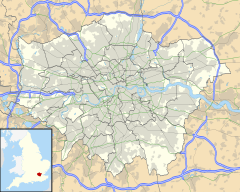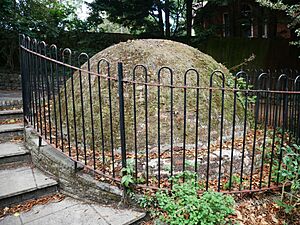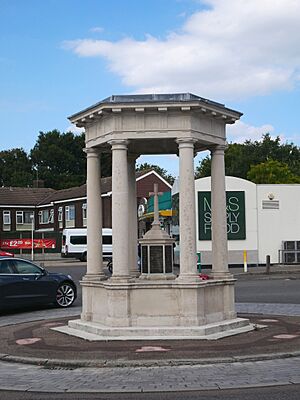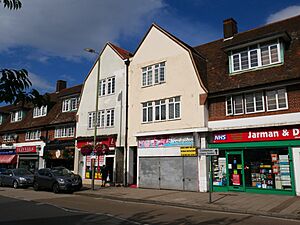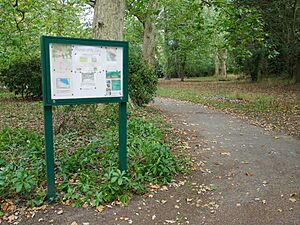Mottingham facts for kids
Quick facts for kids Mottingham
|
|
|---|---|
| Village | |
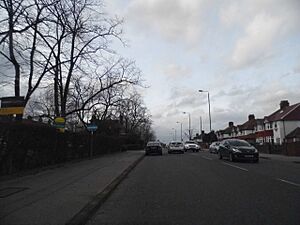 Mottingham Road, the main road through the village |
|
| Population | 11,488 (2021 Census. Mottingham and Chislehurst North Ward) |
| OS grid reference | TQ415725 |
| • Charing Cross | 9 mi (14.5 km) NW |
| London borough | |
| Ceremonial county | Greater London |
| Region | |
| Country | England |
| Sovereign state | United Kingdom |
| Post town | LONDON |
| Postcode district | SE9 |
| Dialling code | 020 |
| Police | Metropolitan |
| Fire | London |
| Ambulance | London |
| EU Parliament | London |
| UK Parliament |
|
| London Assembly |
|
Mottingham is a cool area in south-east London, England. It sits right on the edge of two different London boroughs: the London Borough of Bromley and the Royal Borough of Greenwich. It's located southwest of Eltham, about 1.5 miles (2.4 km) away. Long ago, it was part of the county of Kent.
Contents
Mottingham's History
What's in a Name?
The name Mottingham goes way back to 862 AD, during the Anglo-Saxon era. It was first called Modingahema. This means "the land of Moda's people." People often think it means "the proud place."
An old book from 1830 said that Mottingham was a small village. It was partly in Eltham and partly in Chislehurst. The book explained that its old name, Modingham, came from Saxon words. Modig meant proud or lofty, and ham meant a home.
For a long time, Mottingham was connected to the manor of Eltham. A manor was a large estate with a main house and land. Over the centuries, different families owned parts of Mottingham. They paid rent and did services for the king's court in Eltham.
A Mysterious Sinkhole
Something really strange happened in Mottingham on August 4, 1585. A writer named Thomas Fuller wrote about it. In a field belonging to Sir Percival Hart, the ground suddenly began to sink. Three big elm trees were swallowed into a huge hole! The tops of the trees went down first. By 10 o'clock that morning, the trees were completely gone. The hole quickly filled with water.
The hole was about 80 yards (73 meters) wide. It was so deep that a 50-fathom (91-meter) rope couldn't reach the bottom. People at the time didn't know why this happened. Today, we think it was a sinkhole. Sinkholes happen when the ground collapses, often because of water underground. Mottingham has many streams, some hidden underground. The shifting ground might have caused this "marvellous accident." No one knows exactly where this sinkhole was. The only water body nearby today is a lake at The Tarn Bird Sanctuary.
How Mottingham Grew
Mottingham started as a small farming village. It had a few large houses, like Fairy Hall. In the mid-1800s, it began to grow. Small houses were built on what is now Mottingham Road. Shops called the Terrace also appeared.
Mottingham station opened in 1866. It was first named after Eltham. In the 1880s, a new housing area called West Park was built. These homes were for middle-class families. St. Andrew's church was also built between the station and the village.
In 1923, a new main road, the Sidcup arterial road, was built. This led to even more homes being built in Mottingham. The London County Council (LCC) created the Mottingham estate. This huge project included 2,000 houses, schools, and shops. The estate opened in 1935. A famous pub, The King and Queen, opened in 1937. It was a place for performances. It was replaced by houses in 1992.
In 2019, the Bromley council approved its Local Plan. This plan is like a map for how Bromley will grow until 2030. It aims to make Mottingham's local center better. It also wants to improve connections to other areas, especially places where people work.
Important Places in Mottingham
Churches and Almshouses
The first church in Mottingham was St Andrew's Church on Court Road. It was built in 1884. This church helped Mottingham feel more like its own place, separate from Eltham.
Sir Robert Geffrye's almshouses are on Mottingham Road. Almshouses are special homes for older or poorer people. These were built in 1912 by the Ironmongers' Company. They replaced older almshouses in Hoxton, which are now the Museum of the Home. The homes were updated later, and more housing was added.
Local Landmarks
There used to be a Martins Bank branch in Mottingham village. It faced the war memorial. In 1967, it was the first branch of that bank to have a robbery. It later became a Barclays bank but closed in 1992.
Near the war memorial was also the Porcupine Inn pub. This pub was very old, dating back to at least 1688. The building itself was from around 1800. It was replaced in 1922. The pub closed in 2013. A supermarket chain, Lidl, bought the site. After some discussion, they got permission to build a new store. The new Lidl opened in April 2023.
Mottingham has a branch of the Independent Order of Oddfellows Manchester Unity. This is a friendly group that helps its members.
In Mottingham village, you can see a special sign. It shows Eltham College within tree branches. It also has a cricket bat and ball, which refers to the famous cricketer W G Grace. The sign also shows the date AD 862.
Mottingham and some of its landmarks have even appeared in a mini-documentary series called London Districts.
Learning in Mottingham
Mottingham Primary School
- Age range: 4–11 years old
- Gender: Mixed (boys and girls)
- Number of pupils: 408
- School capacity: 480 pupils
Elmstead Wood Primary School
- Age range: 3–11 years old
- Gender: Mixed (boys and girls)
- Number of pupils: 210
- School capacity: 210 pupils
Capel Manor College
Capel Manor College is a special college. It teaches about the environment and land-based subjects. It offers courses for older students on a campus that used to be part of Hadlow College.
Eltham College
Eltham College is an independent school for boys and girls aged 7–18. It started in 1842. Since 1912, it has been located in the old Fairy Hall in Mottingham. This building was once the Royal Naval School.
Mottingham's Geography
Mottingham is next to several other areas. To the north is Eltham, and to the east is New Eltham. To the south is Chislehurst, and to the southwest is Elmstead. Lewisham is to the west, and Lee is to the northwest. Since 2010, Mottingham has been part of the Mottingham and Chislehurst North voting and policing areas.
The Little Quaggy Stream
A small stream called the Little Quaggy flows through Mottingham. It's a branch of the River Quaggy. It starts near Chislehurst and Mottingham. It flows through The Tarn and then joins the main Quaggy river. The Quaggy then continues to Mottingham playing fields, which people often call 'Foxes Field'.
Mottingham Housing Estates
The London County Council (LCC) bought the Court Farm estate in the early 1930s. They planned to build 2,000 homes there. The first houses were finished in 1935. This area was designed to be a complete community. It had a shopping center and several schools.
An interesting fact: the British gangster film Piggy was filmed in this area. One scene was shot in The Prince of Wales pub on Mottingham Road. Also, an African American boxer named Frank Craig trained at this pub in 1895 for a fight he had.
In 1946, the Woolwich Council built the Coldharbour Estate. This was east of Mottingham Road. It was mainly built to house people who lost their homes during the Blitz in World War II. This finished using up the LCC land.
Getting Around Mottingham
By Train
Mottingham railway station serves the area. You can catch Southeastern trains from here. They go to London Charing Cross and London Cannon Street. Some trains go through Lewisham and others through Woolwich Arsenal. You can also get trains to Dartford.
By Bus
Several London Buses routes serve Mottingham:
- 124: Goes to Eltham and to Catford (via Grove Park)
- 126: Goes to Eltham and to Bromley (via Grove Park)
- 161: Goes to North Greenwich (via Eltham & Woolwich) and to Chislehurst
- 273: Goes to Lewisham Tesco and to Petts Wood
- 624: A school bus that goes to Woolwich and to Grove Park
- 638: A school bus that goes to Kemnal College and to Coney Hall
Famous People from Mottingham
Mottingham has been home to some well-known individuals:
- W. G. Grace: A very famous cricketer.
- Eric Liddell: An athlete and missionary, known for his story in the film Chariots of Fire.
- Denis Healey: A well-known politician.
- Rob Beckett: A popular stand-up comedian.
- Sir John Bertram Adams: A respected physicist.
- Jeffrey Lawal-Balogun: An athlete.
- Charles Folkard: An illustrator.
 | Calvin Brent |
 | Walter T. Bailey |
 | Martha Cassell Thompson |
 | Alberta Jeannette Cassell |


